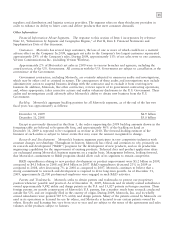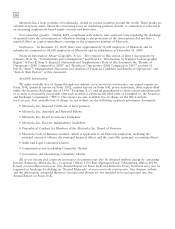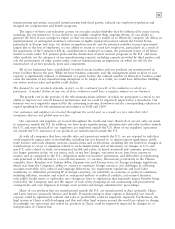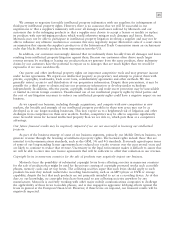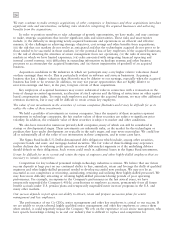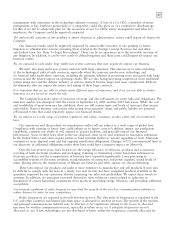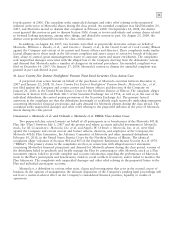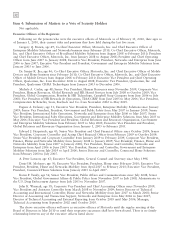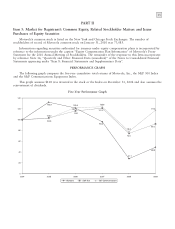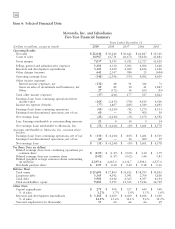Motorola 2009 Annual Report Download - page 32
Download and view the complete annual report
Please find page 32 of the 2009 Motorola annual report below. You can navigate through the pages in the report by either clicking on the pages listed below, or by using the keyword search tool below to find specific information within the annual report.
24
may require the Company to record significant additional goodwill or other long-lived asset impairment charges
in our financial statements in future periods, which could negatively impact our financial results.
Failure of our suppliers to use acceptable ethical business practices could negatively impact our business.
It is our policy to require our suppliers to operate in compliance with applicable laws, rules and regulations
regarding working conditions, employment practices, environmental compliance and trademark and copyright
licensing. However, we do not control their labor and other business practices. If one of our suppliers violates
labor or other laws or implements labor or other business practices that are regarded as unethical, the shipment
of finished products to us could be interrupted, orders could be canceled, relationships could be terminated and
our reputation could be damaged. If one of our suppliers fails to procure necessary license rights to trademarks,
copyrights or patents, legal action could be taken against us that could impact the salability of our inventory and
expose us to financial obligations to a third party. Any of these events could have a negative impact on our sales
and results of operations.
Our success is dependent, in part, upon our ability to form successful strategic alliances. If these arrangements do
not develop as expected, our business may be negatively impacted.
We currently partner with industry leaders to meet customer product and service requirements and to
develop innovative advances in design and technology. Some of our partnerships allow us to supplement internal
manufacturing capacity and share the cost of developing next-generation technologies. Other partnerships allow
us to offer more services and features to our customers. If such arrangements do not develop as expected, our
business could be negatively impacted.
We rely on third-party distributors, representatives and retailers to sell certain of our products.
In addition to our own sales force, we offer our products through a variety of third-party distributors,
representatives and retailers. Certain of our distributors or representatives may also market other products that
compete with our products. The loss, termination or failure of one or more of our distributors or representatives
to effectively promote our products, or changes in the financial or business condition of these distributors,
representatives or retailers, could affect our ability to bring products to market.
We face many risks relating to intellectual property rights.
Our business will be harmed if: (i) we, our customers and/or our suppliers are found to have infringed
intellectual property rights of third parties, (ii) the intellectual property indemnities in our supplier agreements are
inadequate to cover damages and losses due to infringement of third-party intellectual property rights by supplier
products, (iii) we are required to provide broad intellectual property indemnities to our customers, (iv) our
intellectual property protection is inadequate to protect our proprietary rights, or (v) our competitors negotiate
significantly more favorable terms for licensed intellectual property. We may be harmed if we are forced to make
publicly available, under the relevant open-source licenses, certain internally developed software-related
intellectual property as a result of either our use of open-source software code or the use of third-party software
that contains open-source code.
Because our products are comprised of complex technology, much of which we acquire from suppliers
through the purchase of components or licensing of software, we are often involved in or impacted by assertions,
including both requests for licenses and litigation, regarding patent and other intellectual property rights. Third
parties have asserted, and in the future may assert, intellectual property infringement claims against us and
against our customers and suppliers. These assertions against Motorola, and its customers and suppliers have
been increasing as the complexity of our products have increased. Many of these assertions are brought by
non-practicing entities whose principle business model is to secure patent licensing-based revenue from product
manufacturing companies. The patentees often make broad and sweeping claims regarding the applicability of
their patents to Motorola products, seeking a percentage of sales as licenses fees, seeking injunctions to pressure
Motorola into taking a license, or a combination thereof. Defending claims may be expensive and divert the time
and efforts of our management and employees. Increasingly, third parties have sought broad injunctive relief
which could limit our ability to sell our products in the U.S. or elsewhere with intellectual property subject to the
claims. If we do not succeed in any such litigation, we could be required to expend significant resources to pay
damages, develop non-infringing intellectual property or to obtain licenses to the intellectual property that is the
subject of such litigation, each of which could have a negative impact on Motorola’s financial results. However,
we cannot be certain that any such licenses, if available at all, will be available to us on commercially reasonable
terms. In some cases, we might be forced to stop delivering certain products if we or our customer or supplier are
subject to a final injunction.



